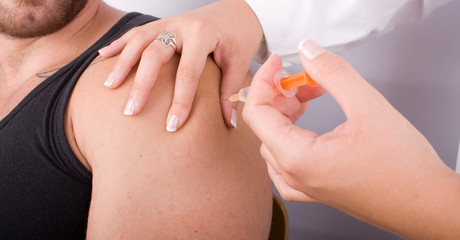Vaccine holds hope for protection against gonorrhoea

There is currently no vaccine that provides protection against gonorrhoea, also known as ‘the clap’. So the discovery that exposure to the meningococcal group B vaccine may reduce the likelihood of contracting the increasingly drug-resistant disease is promising, and may provide a new avenue for vaccine development
Researchers found that a mass New Zealand vaccination program against meningococcal B reduced the incidence of gonorrhoea by approximately 31%, compared to unvaccinated people.
If the effect is confirmed in other currently available and similar meningococcal group B vaccines, administering the vaccine in adolescence could result in significant declines in gonorrhoea, which has increasingly become drug-resistant.
The significance of a vaccine candidate that may have even a moderate effect on reducing rates of infection is highlighted in a new report published in The Lancet Infectious Diseases, which studied more than 14,000 people, and urges global policy action to address sexually transmitted infections (STIs).
So far, efforts to develop a vaccine against gonorrhoea have been unsuccessful despite more than a century of research. Four vaccine candidates have reached clinical-trial stage but none have been effective. However, population data suggests there is a decline in gonorrhoea immediately after the use of the outer membrane vesicle (OMV) meningococcal group B vaccine in Cuba, New Zealand and Norway.
Despite the two diseases being very different in terms of symptoms and mode of transmission, there is an 80–90% genetic match between the Neisseria gonorrhoeae and Neisseria meningitidis bacteria, providing a biologically plausible mechanism for cross-protection.
In New Zealand, approximately 1 million individuals (81% of the population under 20 years) received the MeNZB vaccine, an OMV meningococcal group B vaccine, during a mass immunisation program in 2004–2006, providing a unique opportunity to test the cross-protection hypothesis.
In this study, researchers used data for all people aged 15–30 who had been diagnosed with gonorrhoea or chlamydia, or both, at 11 sexual health clinics and who were eligible to receive the MeNZB vaccine during the 2004–2006 vaccination program. Cases had laboratory-confirmed gonorrhoea and controls had laboratory-confirmed chlamydia.
A total of 14,730 cases and controls were included in the analysis (1241 cases of gonorrhoea, 12,487 cases of chlamydia and 1002 cases of co-infection). Vaccinated individuals were significantly less likely to have gonorrhoea than controls (41% vs 51%). Taking into account all other factors such as ethnicity, deprivation, geographical area and gender, the researchers concluded that having previously received the MeNZB vaccine reduced the incidence of gonorrhoea by approximately 31%.
MeNZB was developed to control a meningitis epidemic and is no longer available, but the OMV antigens thought to provoke the immune response to gonorrhoea have been included in the more recently developed 4CMenB vaccine, available in many countries. The authors say that more research is now needed to see whether other meningococcal vaccines have a similar effect, and to understand the immunological mechanism.
Previous models have suggested that a vaccine with 30% efficacy could decrease prevalence of gonorrhoea by more than 30% within 15 years, if immunity is maintained. Higher efficacy would offer greater protection over a shorter period of time.
In the USA, all teens and pre-teens as well as some children and adults are advised to get one of two meningococcal vaccines. The UK has recently introduced the 4CMenB vaccine for infants and it has also been used in the USA, Canada and Australia.
There are approximately 78 million new cases of gonorrhoea worldwide each year. An increasing number of strains of the bacteria N. gonorrhoeae have developed antimicrobial resistance to all drugs recommended for treatment. Untreated, gonorrhoea can lead to complications of infection, such as pelvic inflammatory disease, ectopic pregnancy and infertility, and the infection can facilitate the transmission of HIV.
Victoria's Q3 median ED wait times the lowest on record
Victoria's quarter three performance data (January–March) has shown improvement across...
Irregularities in a clinician's cases prompt 15-month lookback
St Vincent's Hospital Sydney has detailed a 15-month lookback review — prompted by...
Two researchers receive $899,000 in cardiovascular funding
In heart-related news this Heart Week (5–11 May), two University of Newcastle researchers...











